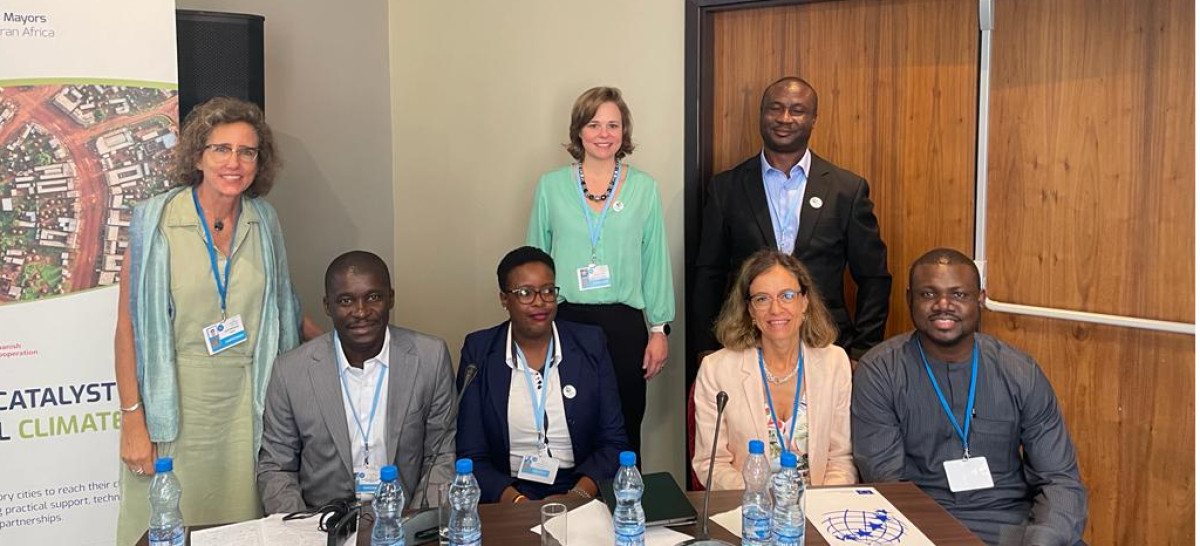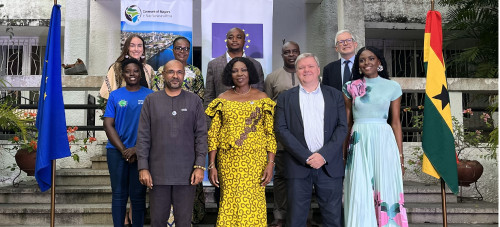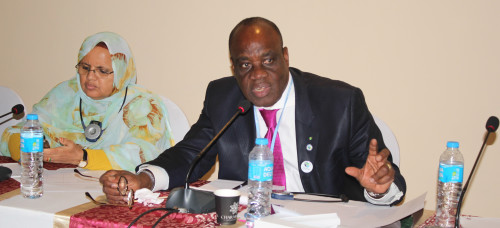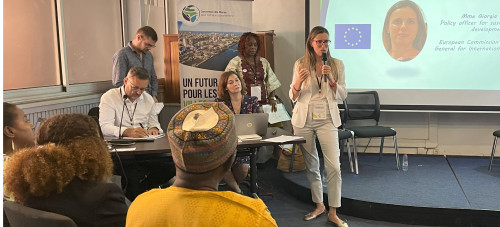Charting the way forward towards a just energy transition in Africa
Published: 6 Sep 2022
Access to Energy
Climate Finance
Events

At Africa Climate Week 2022, Covenant of Mayors in Sub-Saharan Africa hosted a session focused on harnessing renewable energy for the just energy transition in African cities. Leaders from African local governments, energy experts and other stakeholders discussed ambitions and needs to drive this transformative change.
The Just Energy Transition (JET) is championed as a solution to not only facilitate bold, ambitious climate change action at scale, but to also ensure that socio-economic challenges are taken into consideration and improved through the concept of ‘justice’ and putting people first.
Africa contributes less than 10% towards global greenhouse gas emissions, however, it is the continent most vulnerable to some of the most devastating impacts of climate change. These impacts can reduce developmental gains, therefore, there is an urgent need for Africa to chart the course for a resilient and low carbon future, whilst at the same time leverage climate mitigation and its developmental benefits to achieve transformative change.
CoM SSA, a European Union action, supports signatories in realising their climate and energy goals and in order to do this, all signatories commit to developing a Sustainable Energy Access and Climate Action Plan (SEACAP).
Ambassador of the European Union to the Gabonese Republic, the Democratic Republic of São Tomé and Príncipe and the Economic Community of Central African States, Rosário Bento Pais, highlighted the importance of this plan, “Developing a SEACAP is fundamental as it provides value in terms of mitigation and adaptation strategies and sustainable access to energy for cities, but it provides the much-needed guidance for cities and support their institutional capacity building and transition readiness.”
This year, the European Union further strengthened its commitment to accelerating climate action in Africa through its Global Gateway Investment Package, which includes investment funding for Africa worth EUR 150 billion.
The energy transition in Africa is not only about a rapid change from fossil fuels to clean energies but it is also about closing the energy gap and providing affordable energy to all A just energy transition is one of the main ways that we will be able to collectively conquer the challenges of access to energy whilst ensuring that no one is left behind.
CoM SSA signatory, Deputy Lord Mayor of Kampala Capital City Authority in Uganda, Doreen Nyanjura emphasised the responsibility of government in driving this kind of transformation, “We need to be deliberate with climate planning. When floods hit Kampala; it is the persons with disabilities who are affected most, this group is often left behind.”
Just like other CoM SSA signatories, Accra Metropolitan Assembly is driving a people-centred, inclusive clean energy transition. Director: Waste Management, Accra Metropolitan Assembly in Ghana, Engineer Solomon Noi: “We are putting up innovative solutions which are very practical in nature. If we are able to get funds to support the capital expenditure to get the infrastructure that is needed to turn organic waste into biogas - and make it affordable for low-income in society- they would not turn to forests for firewood.”
There is an urgency for upscaling climate and energy projects in Africa. Development Finance Institutions play a crucial role in unlocking the potential of renewable energy technologies in African cities to enable a just energy transition. Regional Principal Officer for Climate Change and Green Growth at the African Development Bank, Dr Olufunso Somorin: “When we use the word “transition” we mean, moving from one thing to another. When we are talking about energy poverty in Africa, we need to reconfigure our definition of what we mean by “transition” if we are transitioning from zero.”
Though there is an urgent need for action, these actions still need to be based on good evidence and science, to avoid maladaptation. We need to make sure energy targets are underpinned by policies. Director for Membership and Institutional Partnerships at REN21, Laura Williamson: “There is African agency! It starts at the city level - how communities function as economic units that drive the energy transition on the continent.”
In the run up to COP27, we need to continue advocating for concrete climate change action and innovation. Putting justice at the forefront of this advocacy must constantly be emphasised. CoM SSA signatory, Mayor of Quelimane Municipal Council in Mozambique, Dr Manuel de Araújo: “This year is an important year for Africa, especially given that COP27 is taking place in Sharm el-Sheikh. This presents a great opportunity for us to showcase our journeys on the world stage but, more importantly, demand bolder and more ambitious climate action from the rest of the world.”
Africa Climate Week 2022, hosted by the Government of Gabon and organised by UN Climate Change, in collaboration with global partners UN Development Programme, UN Environment Programme and the World Bank Group, is the last regional climate week before COP27.





